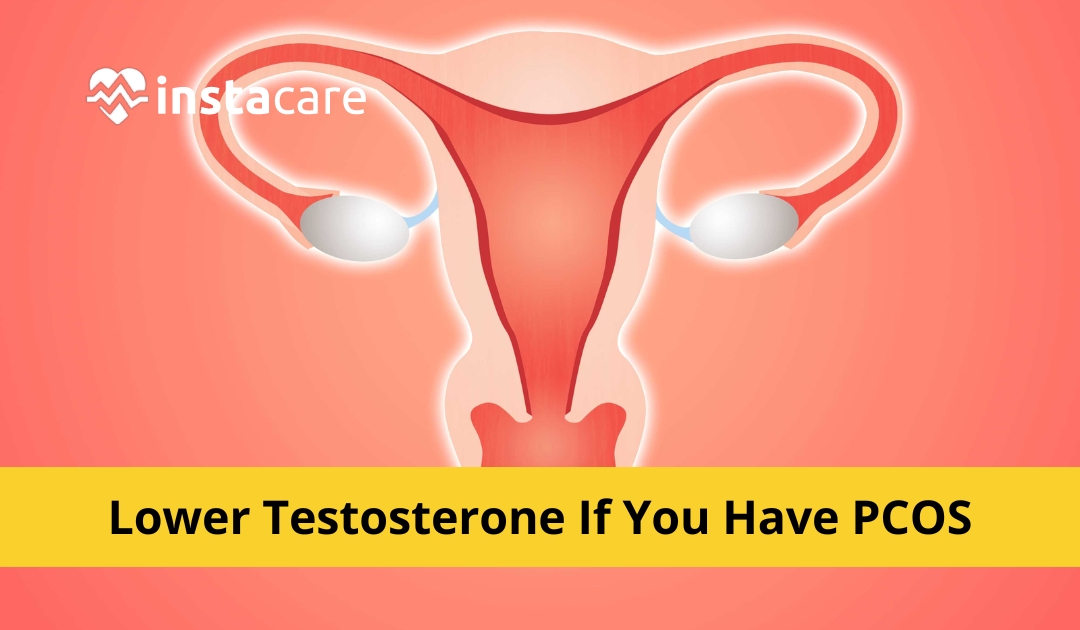Are you struggling with Polycystic Ovarian Syndrome (PCOS) and the myriad of health issues it can cause? More specifically, is high testosterone levels causing physical effects such as unwanted hair growth or changes to your menstrual cycle that are leaving you frustrated? If so, then lowering your testosterone levels could be key to controlling some of the symptoms of PCOS. In this blog post, we’re going to look at 7 ways in which you can lower your testosterone levels if you have PCOS.
What is PCOS?
PCOS, short for Polycystic Ovary Syndrome, is an incredibly common endocrine disorder that affects up to ten percent of women. It is caused by insulin resistance and an excess of the hormone testosterone, which can result in issues with fertility, weight gain, and individual cycles.
This is due to imbalances in progesterone and estradiol hormone levels. To help with this imbalance if you have PCOS, taking steps to lower your testosterone levels can be immensely beneficial: ways to do this may include decreasing refined sugar intake, exercising regularly which increases endorphins in the brain and helps modulate hormones, or using medication recommended by a physician.
What are the symptoms of PCOS?
Polycystic Ovarian Syndrome (PCOS) is a common hormonal disorder that affects millions of women around the world. The primary symptoms associated with PCOS include irregular or absent menstrual periods, excessive body hair growth, difficulty getting pregnant due to ovulation problems, and acne. Additionally, some women may also experience weight gain and thinning hair on the scalp.
Many times, PCOS does not produce outward signs so it can be difficult for some women to diagnose themselves. If you are experiencing any of these symptoms and think you may have PCOS, it is important to visit your doctor for an evaluation and diagnosis. With proper treatment, many symptoms of PCOS can be managed which can greatly improve physical and emotional well-being.
What are typical testosterone levels in PCOS patients?
Women with Polycystic Ovary Syndrome (PCOS) tend to have higher levels of the hormone testosterone than women who do not have PCOS. Generally, the typical range for testosterone in healthy females is below 30 ng/dL, while a woman with PCOS may see levels from 50-210 ng/dL – or even higher. Different factors can contribute to the observed differences, such as lifestyle habits and overall health.
However, having high testosterone does not necessarily indicate that a person has PCOS. It is important for women to consult their healthcare provider for proper evaluation and diagnosis if symptoms are present.
View More: Implantation Bleeding - Causes Symptoms And Treatment
What causes high testosterone in PCOS?
Polycystic ovary syndrome (PCOS) is a disorder of the endocrine system that affects 1 in 10 women of childbearing age and can lead to higher levels of testosterone. It is believed that this high testosterone level is caused by increased LH or luteinizing hormone secreted by the pituitary gland which stimulates the ovaries to produce more androgen, resulting in elevated testosterone levels.
This disruption of endocrine signals may be caused by a combination of genetic and environmental factors such as obesity, stress, and glucose intolerance. Treatment usually involves lifestyle changes such as maintaining a healthy weight along with medication to control hormones and restore regular menstruation cycles. By taking appropriate action you can help restore your body’s balance of hormones and reduce symptoms associated with PCOS such as hirsutism, acne, and irregular menstrual cycles.
7 Ways To Lower Testosterone Levels If You Have PCOS
1- Don't take hot baths or showers
One of the ways to lower testosterone levels if you have Polycystic Ovarian Syndrome (PCOS) is to not take hot baths or showers. Hot water can raise core body temperature and increase testosterone production, so instead opt for warm or lukewarm temperatures.
Taking a cool shower can help fight fatigue, aches and pains, and flushes out built up toxins in the body while also improving blood circulation. Just keep in mind that it takes your body 3-4 days to adjust to the new temperature so it may take 1 or 2 days before you start noticing any symptom relief.
2- Avoid processed foods
Avoiding processed foods is one of the best ways to lower testosterone levels in women with PCOS. Processed foods can contain high amounts of preservatives, hormones, and additives which can cause an imbalance in hormones like testosterone. Eating fresh whole foods like fruits, vegetables and whole grains can help maintain healthy hormone levels and promote better health overall.
Incorporating more natural sources of protein such as legumes, nuts, and beans can also reduce your risk for hormone imbalances caused by excess testosterone. Widespread availability of processed food has made it difficult to resist eating unhealthy snacks on the go; however making mindful decisions about what we consume is key to healthier living.
3- Reduce your intake of caffeine and alcohol
Reducing your intake of caffeine and alcohol can help lower testosterone levels if you have PCOS. Caffeine and alcohol both raise cortisol levels in the body, which can lead to higher testosterone concentrations. It’s best to try cutting down on these substances gradually.
Start by replacing caffeinated beverages with herbal tea or diluted fruit juices, and choose alcohol-free beer or wine when you choose to drink. Additionally, some evidence suggests that moderate dairy intake may help reduce testosterone levels as well. Making small changes in your diet can help improve symptoms from PCOS and keep your hormones balanced.
4- Get regular exercise
Exercise is essential for overall health and well-being, but it can play an even more vital role in treating Polycystic Ovary Syndrome (PCOS). Regular exercise helps to reduce the testosterone levels associated with PCOS, aiding in other treatment options. Working out for as little as 30 minutes per day, 4-5 times a week can help you experience a healthier lifestyle and augmented relief from hormonal symptoms. However, not just any exercise will do.
High intensity cardio and strength workouts are recommended in order to keep your metabolism elevated, allowing you to burn calories more efficiently and reduce any fat accumulation related to potential hormonal imbalances. Becoming physically active also helps reduce stress levels which can be another contributing factor to PCOS management.
View More: 8 Symptoms of Low DHEA Levels In Female All You Need To Know
5- Practice stress-relieving techniques
Stress is an unavoidable part of life, but it doesn’t have to ruin our physical and mental health. Practicing stress-relieving techniques such as deep breathing, progressive muscle relaxation and yoga can help us keep stress in check. Women with polycystic ovary syndrome (PCOS) may especially benefit from these methods; recent studies have established a link between high testosterone levels and excess stress hormones.
So by calming down the body through practical ways like meditation and yoga, we can even help to lower our testosterone levels while preventing the negative side effects of too much stress. If you're feeling overwhelmed, try incorporating some ways to relax into your daily routine - it could end up making a world of difference.
6- Lose weight if you're overweight
The journey of losing weight can be a difficult one, especially if you are struggling with an underlying condition like PCOS. PCOS is an endocrine disorder that causes hormonal imbalances and can lead to increased body fat, irregular menstrual cycle, and insulin resistance. One way to combat these symptoms is ways to lower testosterone levels through diet and lifestyle changes.
To begin, focus on a balanced eating pattern, a regular exercise regimen incorporated into each week, minimizing stress levels, and talking to your doctor about potential medications or supplements that may help. In addition, be sure to get adequate rest and sleep every night as well as drinking plenty of water throughout the day. With dedication and consistency in making healthier lifestyle choices, it is possible to reduce your testosterone levels in order to successfully lose weight.
7- Eat a healthy diet
Eating a healthy diet is an important factor in keeping your body fit and healthy. As far as ways to lower testosterone levels if you have Polycystic Ovarian Syndrome (PCOS), this can be accomplished when following a balanced diet that has carbohydrates, protein, and healthy fats. Eating more vegetables and fruits, whole grains, legumes, nuts, and seeds can also help to reduce excess triglycerides and bring down testosterone levels.
You should also try to limit sugary foods and drinks, processed or fried food items, processed meats and high-fat dairy products. All together these dietary changes can help improve PCOS symptoms such as reducing hirsutism (excess hair growth) which is related to elevated testosterone levels.
Foods to Lower Your Testosterone Naturally
For those affected by polycystic ovary syndrome (PCOS), ways to lower testosterone levels can feel like a daunting task. Luckily, there are ways to lower testosterone levels with diet and certain food choices. Many plant-based foods, such as flax, oats, barley and quinoa, contain fiber that binds to testosterone and limits its absorption in the body. Foods such as beans and legumes can have a similar result — due to their high fiber content.
Likewise, increasing your intake of vegetables rich in carotenoids, such as carrots and squash, as well as calcium-rich foods—from dairy or fortified soy milk—can help fight excess hormones. Eating fatty fish is also recommended for the omega-3 fatty acids which may reduce inflammation related to PCOS symptoms including hirsutism (excess hair growth) and acne. By adding these foods into your regular routine you can naturally counter the effects of high testosterone levels associated with PCOS without any drugs needed!
Please book an appointment with the best Gynecologist in Lahore, Karachi, Islamabad, and all major cities of Pakistan through InstaCare, or call our helpline at 03171777509 to find the verified doctor for your disease.
Source: https://instacare.pk/blog/ways-to-lower-testosterone












